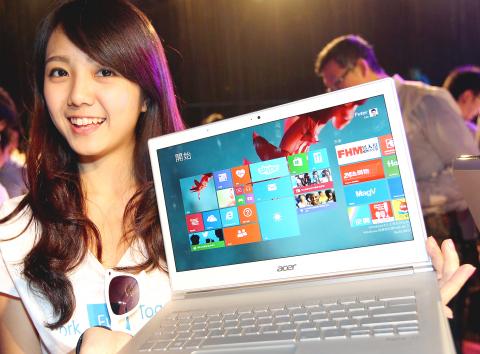Microsoft Corp yesterday said it plans to collaborate with 3D printer makers, including Taiwan’s New Kinpo Group (新金寶集團), to explore 3D printing market with its Windows 8.1 mobile operating system.
“Given the 3D printing market has huge growth potential but remains underdeveloped, we think it is advantageous for Microsoft to enter this battlefield and hold a share as soon as possible,” Microsoft Taiwan Corp’s marketing and operations general manager Roan Kang (康容) said.
Kang said Microsoft’s embedded application installed on Windows 8.1 platform can read nearly every kind of document format, offers a wider selection of colors and processes printing works more quickly than existing software programs do.

Photo: CNA
“Microsoft may collaborate with the world’s top three 3D printer makers [3D Systems Corp, Stratasys Ltd and ExOne Co] to expand its share in the 3D printing market, while strengthening its foothold in the mobile device market,” Kang told reporters after an event to announce the Windows 8.1 launch in Taipei.
New Kinpo in August introduced its 3D printers, priced as low as at NT$15,000 (US$510.81), and vowed to ship 1 million units of its low-priced 3D models in three years.
Asked by reporters if the company will seek collaboration with New Kinpo, Kang said: “Microsoft of course will not miss any opportunity working with talent, including those from Taiwan.”
New Kinpo yesterday declined to answer if Microsoft has contacted the company about the collaboration. A company official said by telephone that New Kinpo would have to get more familiar with Windows 8.1 before carrying out any new business project.
Due to a lack of applications by developers, Microsoft’s Windows 8 operating system introduced last year failed to boost global PC shipments.
In a report released on Aug. 29, the International Data Corp revised downward its forecast for global PC shipments this year to a 9.7 percent decline, lower than its earlier estimates of a 7.8 percent and 1.3 percent contraction in May and March respectively.
“We know there are ample opportunities ahead, but we still need to speed up to catch them,” Microsoft Taiwan general manager Davis Tsai (蔡恩全) told reporters at the same event.
Tsai said Microsoft had made strong efforts to establish a sales force and redesign its new platform after receiving feedback from customers over the past 12 months.
Currently, the Windows app store has generated more than 120,000 applications for up to 3,000 different tablet, laptop or desktop models to access.
Asked whether Microsoft would continue selling its Windows RT operating system — a variant of the Windows 8 operating system designed for mobile devices equipped with ARM Holdings PLC’s chips and processors — Tsai said “Microsoft will continue its works for the Windows RT platform because ARM’s architecture remains
important to the company.”
In addition to the upgrade for the Windows 8 platform, Microsoft yesterday also provided a free version of its Office Outlook software for Windows RT operating system users to check their daily schedules on the go, Tsai said.

CHIP RACE: Three years of overbroad export controls drove foreign competitors to pursue their own AI chips, and ‘cost US taxpayers billions of dollars,’ Nvidia said China has figured out the US strategy for allowing it to buy Nvidia Corp’s H200s and is rejecting the artificial intelligence (AI) chip in favor of domestically developed semiconductors, White House AI adviser David Sacks said, citing news reports. US President Donald Trump on Monday said that he would allow shipments of Nvidia’s H200 chips to China, part of an administration effort backed by Sacks to challenge Chinese tech champions such as Huawei Technologies Co (華為) by bringing US competition to their home market. On Friday, Sacks signaled that he was uncertain about whether that approach would work. “They’re rejecting our chips,” Sacks

NATIONAL SECURITY: Intel’s testing of ACM tools despite US government control ‘highlights egregious gaps in US technology protection policies,’ a former official said Chipmaker Intel Corp has tested chipmaking tools this year from a toolmaker with deep roots in China and two overseas units that were targeted by US sanctions, according to two sources with direct knowledge of the matter. Intel, which fended off calls for its CEO’s resignation from US President Donald Trump in August over his alleged ties to China, got the tools from ACM Research Inc, a Fremont, California-based producer of chipmaking equipment. Two of ACM’s units, based in Shanghai and South Korea, were among a number of firms barred last year from receiving US technology over claims they have

It is challenging to build infrastructure in much of Europe. Constrained budgets and polarized politics tend to undermine long-term projects, forcing officials to react to emergencies rather than plan for the future. Not in Austria. Today, the country is to officially open its Koralmbahn tunnel, the 5.9 billion euro (US$6.9 billion) centerpiece of a groundbreaking new railway that will eventually run from Poland’s Baltic coast to the Adriatic Sea, transforming travel within Austria and positioning the Alpine nation at the forefront of logistics in Europe. “It is Austria’s biggest socio-economic experiment in over a century,” said Eric Kirschner, an economist at Graz-based Joanneum

BUBBLE? Only a handful of companies are seeing rapid revenue growth and higher valuations, and it is not enough to call the AI trend a transformation, an analyst said Artificial intelligence (AI) is entering a more challenging phase next year as companies move beyond experimentation and begin demanding clear financial returns from a technology that has delivered big gains to only a small group of early adopters, PricewaterhouseCoopers (PwC) Taiwan said yesterday. Most organizations have been able to justify AI investments through cost recovery or modest efficiency gains, but few have achieved meaningful revenue growth or long-term competitive advantage, the consultancy said in its 2026 AI Business Predictions report. This growing performance gap is forcing executives to reconsider how AI is deployed across their organizations, it said. “Many companies